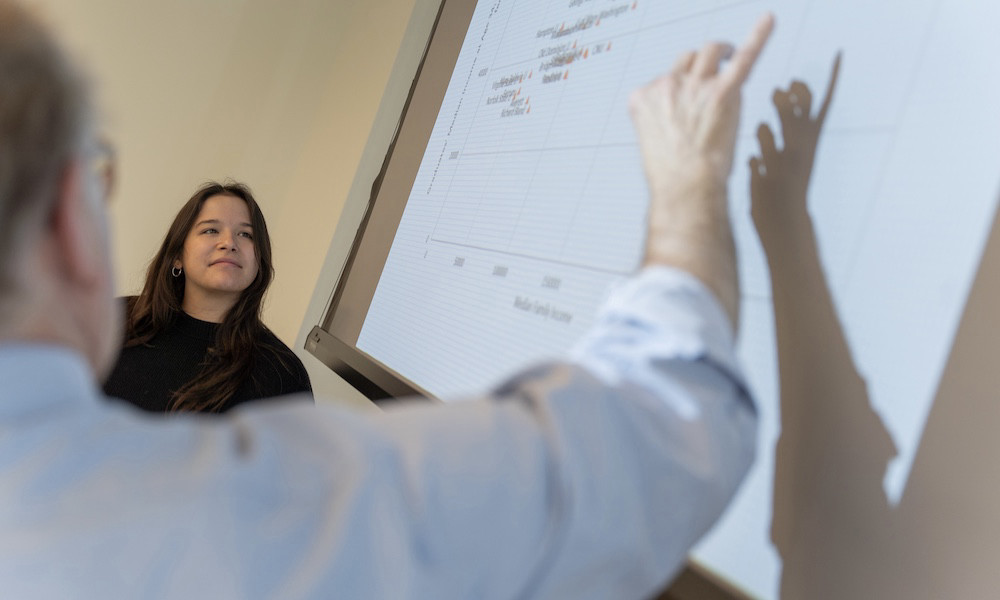Research is in our DNA
News
SUMMARY: When the university was designated R2 by the Carnegie Commission, it drew attention to the important research being produced on campus. The College of Business has long been contributing to relevant scholarship.
In February 2022, when James Madison University announced it had been classified by the Carnegie Commission as an R2 Doctoral University with high research activity, it sparked university-wide interest in what the change in status might mean for individual colleges. In the College of Business, the answer is clear, as research has long been part of the college's DNA.
"One of the arguments I made was that the College of Business has always operated as an R2," said Scott Gallagher, associate dean for academic affairs. “It just took the rest of the university a while to catch up.”
Because the college is accredited by the Association to Advance Collegiate Schools of Business (AACSB), there are guidelines and expectations that must be met in order to satisfy the criteria for re-accreditation. However, AACSB does not provide explicit requirements for the volume of faculty research. Instead, individual colleges are responsible for defining and enforcing their own standards.
“We developed our standards back in 2004,” Gallagher said. In the College of Business the standard for faculty is a minimum of two quality, peer-reviewed journal articles and evidence of two ongoing projects every five years, where an “ongoing” project could be anything from a conference presentation to a contribution to a textbook. “Two papers doesn't sound like a lot, but it is,” Gallagher added. “Remember, it only takes about four papers over five years for someone to earn tenure.”
As research standards have evolved, the college has prioritized not just quantity, but quality. “There’s a proliferation of journals now, especially open-access ones where you pay to publish. That’s why the word ‘quality’ matters,” Gallagher explained.
Because publication timelines are often lengthy—sometimes taking years for an article to move from submission to final publication—it can be difficult to determine exactly how many pieces were published in a given year. Still, Business Librarian and Associate Professor Elizabeth Price estimates that the College of Business, along with its affiliate schools—the School of Strategic Leadership Studies and the Hart School of Hospitality, Sport and Recreation Management—produced 36 publications in the 2024–25 academic year.
In order to meet the stipulated standards while maintaining scholarly momentum, the college makes significant investments in research infrastructure, data access and faculty support. In the 2024-25 year, the College of Business spent approximately $700,000 on research-related costs.
“This number includes things like summer research grants, travel to academic conferences and access to essential data platforms,” said Gallagher. For example, the college pays around $65,000 a year to access financial data through Wharton Research Data Services (WRDS), a critical tool needed by finance faculty. “We wouldn’t be able to have a finance department without that data,” Gallagher said. “That’s the price of doing research at a high level.”
The College of Business and its faculty also work hard to ensure undergraduates are being exposed to research projects and are developing relevant skills. Through the Research Experience for Undergraduates (REU) program, students have the opportunity to collaborate with a faculty member as a research assistant reviewing literature, developing surveys, collecting and cleaning data and analyzing results.
Tim Ozcan, director of the program and associate professor of Marketing, noted a steady increase in both REU participants and faculty-student pairings in recent years. In the Spring 2025 semester alone, 28 faculty members and 30 students took part in the program. Many of these collaborations extend across multiple semesters, allowing teams to engage in deeper, more sustained research over time. Additionally, every department in the CoB was represented in the REU program this past semester.
The impact of the REU program is best illustrated through the work of its participants. This year, both faculty-led and student-driven projects have explored timely, relevant topics with real-world implications. Two examples—one a faculty research initiative and the other a student collaboration through REU—showcase the depth and diversity of scholarship taking place in the College of Business.
 Raktim Pal, professor of Computer Information Systems (CIS) and holder of the Kirby L. Cramer Chair in Business Administration, received the Best Contribution to Theory Award at the Northeast Decision Sciences Institute conference for a paper co-authored with Nezih Altay of DePaul University. Titled “A Comparative Look into Coping and Other Organizational Theories to Explain Organizational Resilience,” the paper explores how “coping theory”—a term borrowed from psychology—offers a novel lens for understanding how organizations respond to disruption.
Raktim Pal, professor of Computer Information Systems (CIS) and holder of the Kirby L. Cramer Chair in Business Administration, received the Best Contribution to Theory Award at the Northeast Decision Sciences Institute conference for a paper co-authored with Nezih Altay of DePaul University. Titled “A Comparative Look into Coping and Other Organizational Theories to Explain Organizational Resilience,” the paper explores how “coping theory”—a term borrowed from psychology—offers a novel lens for understanding how organizations respond to disruption.
“During the COVID-19 pandemic we observed that many organizations struggled, but a few thrived,” Pal said. “We delved deeper to understand how organizations try to bounce back or develop resilience.” While traditional organizational theories explain some elements of resilience, the paper argues that coping theory provides a more effective framework for understanding how resilience is built over time. “It brings a novel and rational perspective... and fills an important gap in current literature,” he said.
Will Jones (‘25), a CIS major, sparked a fascinating interdisciplinary research collaboration after expressing interest in self-driving cars. Over two years, with mentorship from Elham Torabi, associate professor of CIS, and Gizem Atav, associate professor of Marketing, and support from a competitive $10,000 4-VA grant, the team combined theories from marketing and information systems to study consumer adoption of autonomous vehicles.
“For consumers to adopt this new technology, they should first be able to trust it,” said Torabi, highlighting trust as the critical link connecting multiple theoretical frameworks and influencing behavioral intentions. Jones, Torabi and Atav’s findings reveal how perceptions of risk and innovation shape willingness to adopt this emerging technology across different age groups. They presented their research at the 2025 Southeast Decision Sciences Institute conference and at the 2025 annual meeting of the Production and Operations Management Society.
From faculty scholarship to student-driven inquiry, research in the College of Business is marked by curiosity, collaboration and real-world relevance. Whether investigating organizational resilience or exploring consumer adoption of emerging technologies, CoB researchers are addressing timely challenges while mentoring the next generation of scholars. As the university’s R2 designation continues to shape its future, the College of Business remains steadfast in its commitment to producing impactful research that informs practice, supports innovation and enriches the academic experience for all.
